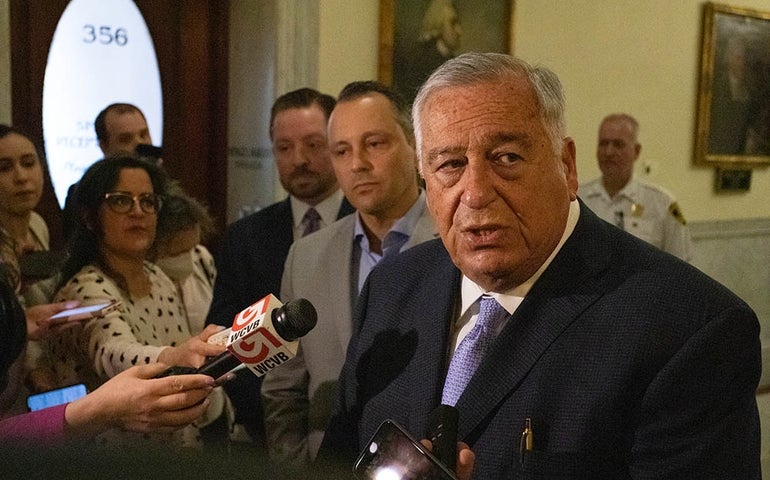With seven weeks until the end of formal sessions, House Speaker Ronald Mariano is not stressing about the fact that some of the major items left on the Legislature’s to-do list, including an energy/climate bill and a sweeping economic development bill, have still not even emerged from the committee level.
“There’s always time,” the speaker said Wednesday when asked if lawmakers have left themselves enough time to get those bills done by the time formal sessions end for the year on July 31. Democrats control the House and Senate, but often disagree on policy and spending plans and have a history of prolonged negotiations.
The economic development bill is generally among the last handful to be sent to the governor’s desk each legislative session, though two years ago the Legislature was paralyzed by unanticipated tax rebates the state was required to provide taxpayers and what had long been thought of as a sure thing to pass was left on the cutting room floor for months after formal sessions concluded.
Mariano said Wednesday that House Ways and Means Chairman Aaron Michlewitz “is working on it now.”
Touching on energy, the speaker seemed to throw cold water on the idea that lawmakers could tackle an expansive climate and energy policy bill along with the numerous other issues they hope to make progress on, including the state budget, health care reforms, gun law changes, a significant housing policy and borrowing bill, and more.
Mariano and Senate President Karen Spilka have each said their chambers intend to pass some kind of energy and climate bill this session, but no concrete proposal has yet emerged for consideration by either branch, and the committee that reviews energy proposals this session was mired in a dispute over operating rules that caused a split on the panel.
Spilka pledged a “comprehensive plan” from the Senate, but Mariano on Wednesday said he expects a more narrow bill.
“With energy, we’re in the siting stage now. There are things that we need to get done. We have done some of the major tactical things that put us in a good footing for the industry, especially offshore wind. Now we have some siting issues we have to take care of. So we are working on those now and that’s the primary focus right now,” he told reporters after a caucus of House Democrats on Wednesday.
He added, “So this being categorized as a big, sweeping energy bill may not be accurate.”
Asked Wednesday if he was suggesting the House would take up a pared-down climate bill, Mariano responded, “I’m not suggesting anything. I’m telling you what we’re working on now, we’re working on the siting situation and the issues around siting.”
Gov. Maura Healey’s administration has not offered a specific proposal, but has been drafting legislation to make reforms to the siting and permitting of clean energy infrastructure that it says are absolutely necessary for the state to meet its statutory greenhouse gas reduction requirements. A key administration official previewed the bill last week on a webinar alongside the Legislature’s energy point people, Telecommunications, Utilities and Energy Chairmen Rep. Jeff Roy and Sen. Michael Barrett.
On Thursday morning, POLITICO’s Massachusetts Playbook reported that the Senate’s energy/climate bill will be released next week and cited Barrett as saying parts of the bill were still being written as of Wednesday night.
There is general agreement among utility companies, environmental activists and others that the existing energy project permitting and siting process is a poor model. It often takes a long time to get a project through the process, it can be overly complicated for the public to follow proceedings, it requires a lot of money for both proponents and opponents alike, it does not always incorporate feedback from impacted communities, and disproportionately those impacted communities are places where residents are poorer, part of a minority population or speak a language other than English.
A special commission convened by the governor recommended consolidating all state, regional and local permits required for larger clean energy infrastructure projects into one permit to be issued by the Energy Facilities Siting Board in no more than 15 months, and to combine all local permits for smaller clean energy infrastructure projects into one consolidated permit to be issued by the municipality in less than one year.
During the webinar last week, Roy said he planned to expand the siting proposal with policies from House bills to expand electric vehicle charging across the state, decarbonize public schools and authorize new energy procurements.
He also said it would incorporate elements from two other bills: H 4502 to forecast electric vehicle charging demand through 2045 along highways and other major roadways and service plazas, and identify sites for a statewide network of fast charging hubs; and H 4503 calling for a new procurement of 9.45 million megawatt hours of clean energy resources, and authorizes additional procurements if the administration deems them necessary.

